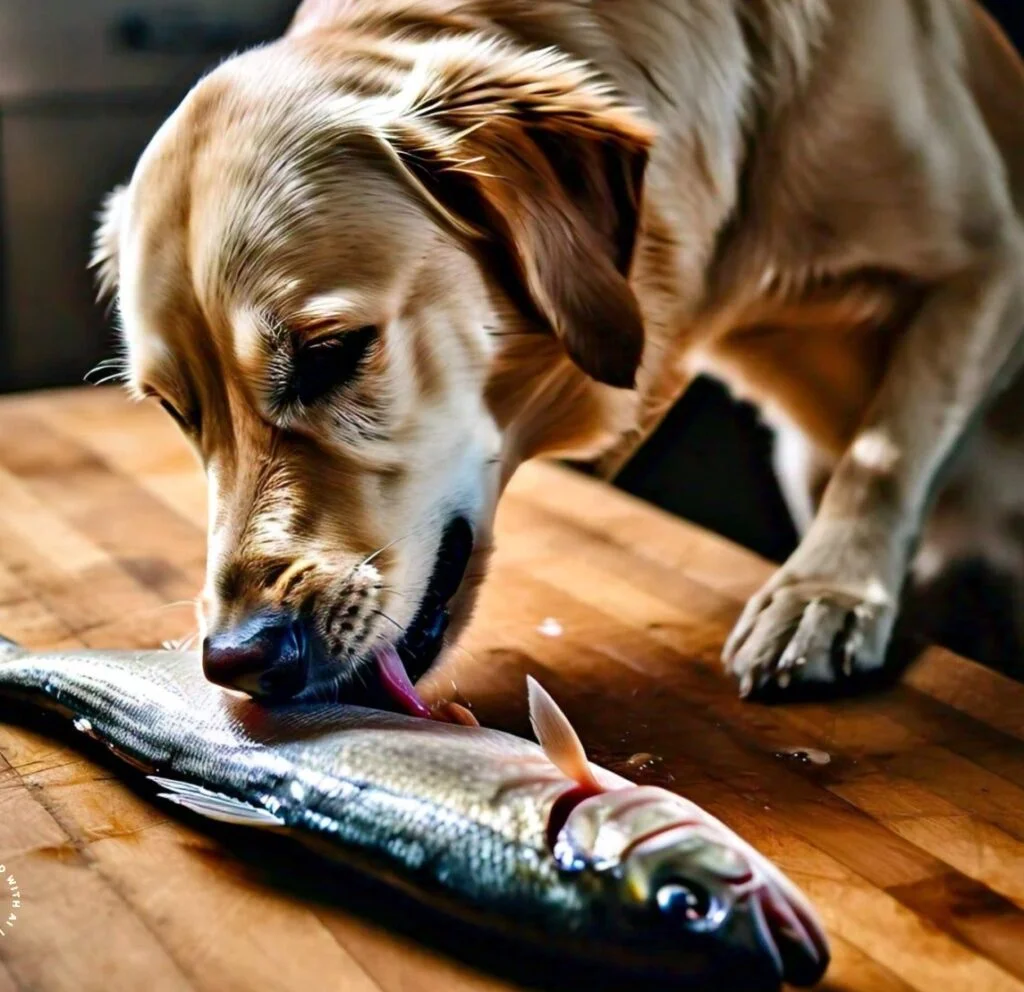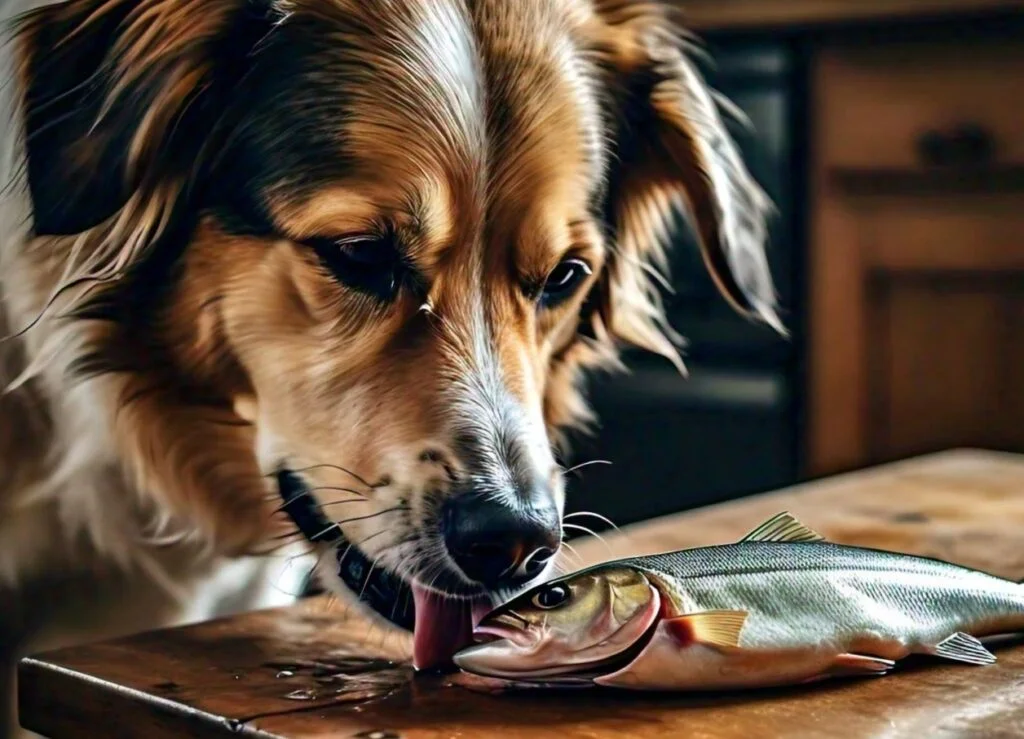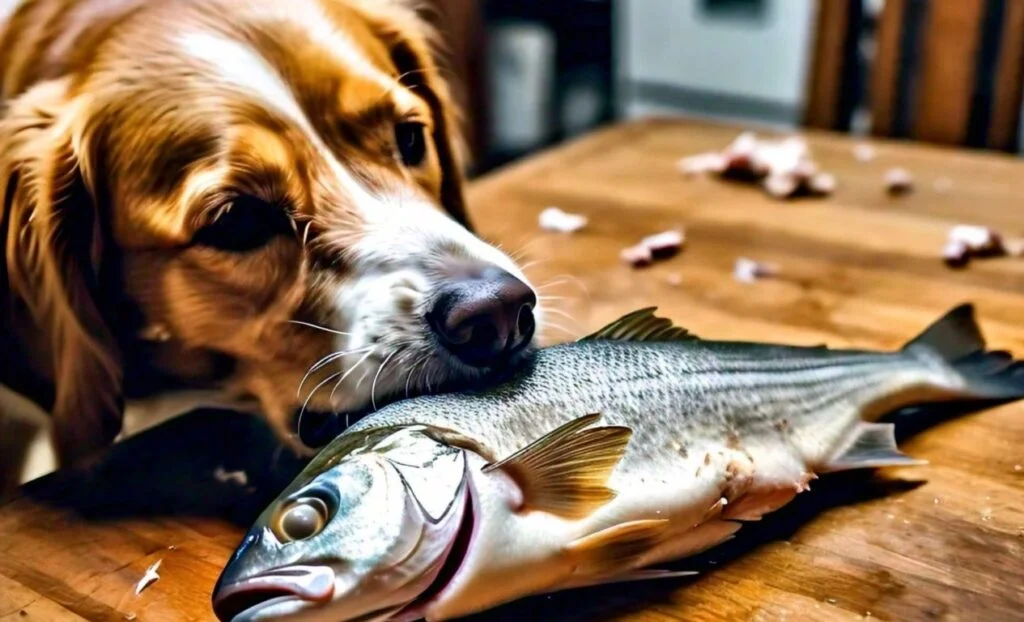Tuna for Dogs:
Can dogs eat tuna? We all love sharing our meals with our furry companions, and tuna, with its flaky texture and savory taste, can be a tempting treat to offer your dog. But before you crack open a can, there are some important things to know about feeding tuna to your canine friend.
Is Tuna Fish Good for Dogs?
Tuna can be a treat for dogs in small amounts, but it’s not necessarily “good” for them in the way a balanced dog food is. Here’s a breakdown:
The Good:
- Protein: Tuna is a lean source of protein, important for muscle maintenance.
- Omega-3s: These healthy fats contribute to a shiny coat, healthy skin, and joint health.
- Vitamins and Minerals: Tuna contains vitamins B12 and D, as well as selenium, beneficial for various bodily functions.
The Not-So-Good:
- Mercury: Tuna, particularly larger varieties like albacore, can be high in mercury. Mercury poisoning is a risk for dogs if they consume too much tuna.
Safe Tuna Consumption for Dogs:
- Moderation is Key: Occasional treat, not a regular dietary component. A small amount (tablespoon for large dogs, teaspoon for small dogs) is sufficient.
- Water-Packed is Best: Choose tuna packed in water rather than oil or brine, and avoid added salt.
- Chunk Light is Safer: Opt for chunk light tuna, which generally has lower mercury content than albacore.
Alternatives to Tuna:
- Salmon: Lower in mercury and packed with omega-3s, cooked salmon can be a great occasional treat.
- Sardines: Small fish with good omega-3 content and typically low mercury levels.
- Cooked Whitefish: Skinless, cooked whitefish like cod or haddock are safe and nutritious for dogs.
The Bottom Line:
Consult your veterinarian before introducing tuna to your dog’s diet, especially if they have any underlying health conditions. If you do give tuna, keep it as a rare treat and prioritize a balanced dog food for their complete nutritional needs.
Tuna for Puppies?
It’s best to avoid giving tuna to puppies altogether. Here’s why:
- Developing System: Puppies are still developing their organs and systems, making them more sensitive to potential toxins like mercury, which can be found in tuna.
- Mercury Risks: Even small amounts of mercury can be harmful for a growing puppy.
- Nutritional Needs: Puppies require a specific balance of nutrients for proper growth and development. Tuna isn’t a complete food and shouldn’t replace their puppy food.
There are plenty of safe and healthy treats specifically formulated for puppies. Consult your veterinarian for recommendations on treats that will complement your puppy’s diet and nutritional needs.
The Benefits of Tuna for Dogs
Tuna packs a punch of nutrients that can be beneficial for dogs in small amounts. Here’s a breakdown of the good stuff:
- Protein: Tuna is a lean source of protein, which is essential for building and maintaining muscle mass.
- Omega-3 Fatty Acids: These healthy fats contribute to a shiny coat, healthy skin, and even joint health in your dog.
- Vitamins and Minerals: Tuna contains vitamins B12 and D, as well as selenium, which play a role in various bodily functions for your pup.
The Mercury Concern
The biggest drawback to tuna is the potential for mercury poisoning. Mercury is a heavy metal that can accumulate in fish, and larger, longer-living fish tend to have higher levels. Tuna, particularly varieties like albacore (white tuna), tend to be higher in mercury. Mercury poisoning in dogs can cause digestive issues, nervous system problems, and kidney damage.
Safe Tuna Consumption for Dogs
So, can your dog enjoy some tuna safely? The answer is yes, with some key limitations:
- Moderation is Key: Tuna should be an occasional treat, not a regular part of your dog’s diet. A small amount, like a tablespoon for a large dog or a teaspoon for a small dog, is plenty.
- Pick Your Tuna Wisely: Opt for canned tuna packed in water rather than oil or brine. Avoid tuna with added salt as well. Chunk light tuna generally contains lower levels of mercury compared to albacore tuna.
- Consult Your Vet: If you’re unsure about introducing tuna to your dog’s diet, or if your dog has any underlying health conditions, consult your veterinarian for guidance.




Alternatives to Tuna
If you’re concerned about mercury content or simply want to offer your dog a different kind of fish, there are safer options available:
- Salmon: Packed with omega-3 fatty acids and lower in mercury than tuna, cooked salmon can be a great occasional treat.
- Sardines: These small fish are a good source of omega-3s and typically have low mercury levels.
- Cooked Whitefish: Skinless, cooked whitefish like cod or haddock are safe and nutritious for dogs.
Remember: When introducing any new food to your dog’s diet, start with a small amount and monitor for any digestive upset. If your dog experiences vomiting, diarrhea, or other signs of illness after eating tuna, discontinue feeding it and consult your veterinarian.
By following these guidelines, you can share the taste of tuna with your dog while keeping their health and safety in mind.
Other Fish Options for Dogs
| Fish | Good for Dogs | Notes |
|---|---|---|
| Salmon (cooked) | Yes | Great source of omega-3 fatty acids, lower in mercury than tuna. |
| Sardines (canned in water) | Yes | Good source of omega-3 fatty acids, typically low in mercury. Choose sardines packed in water, not oil. |
| Whitefish (cooked, skinless) | Yes | Safe and nutritious, examples include cod and haddock. |
| Tuna (canned in water, occasional treat) | Limited Good | Lean protein source, but limit due to mercury content. Choose chunk light tuna packed in water. |
| Other | Not Recommended | Avoid fish high in mercury (e.g., swordfish, king mackerel, tilefish) or with bones (e.g., whole fish). |
Peoples also ask?
Can a dog eat canned tuna?
Yes, dogs can consume canned tuna in moderation, but there are important considerations:
- Limited Amounts: Canned tuna should be an occasional treat, not a regular dietary component. A small amount (tablespoon for large dogs, teaspoon for small dogs) is sufficient.
- Water-Packed is Best: Choose tuna packed in water rather than oil or brine, and avoid varieties with added salt.
- Mercury Concerns: Tuna, especially albacore, can contain high mercury levels. Limit the frequency and opt for chunk light tuna, which generally has lower mercury content.
Learn More: Can Dog Eat this food? View our Articles
How much fresh tuna can I give my dog?
Fresh tuna carries the same mercury concerns as canned tuna. It’s best to consult your veterinarian before giving your dog fresh tuna, and even then, moderation is key. Stick to a small, cooked portion if your vet approves.
Is tuna in oil good for dogs?
No, tuna in oil is not recommended for dogs. The oil adds unnecessary fat and calories to their diet. Opt for tuna packed in water for a healthier option.
Can dogs eat tuna mayo?
Tuna mayo is a definite no-no for dogs. It contains ingredients harmful to canines, including:
- Mayonnaise: Mayonnaise is often high in fat and can cause digestive upset in dogs.
- Onions and Garlic: These are toxic for dogs and can cause serious health problems.
If you’re looking for a healthy treat for your dog, stick to plain canned tuna packed in water, offered in very small quantities.
Can Dogs Share the Tuna Love?
Tuna is a delicious and versatile fish for humans, but can our canine companions enjoy it too? The answer, like many things related to dog diets, is a nuanced “it depends.” Let’s dive into the details of tuna and canine consumption.
Can Dogs Eat Canned Tuna?
Yes, dogs can occasionally enjoy canned tuna, but with significant limitations:
- Moderation is Key: Tuna should be a rare treat, not a regular part of your dog’s diet. A small amount (a tablespoon for large dogs, a teaspoon for small dogs) is plenty.
- Water-Packed Wins: Choose tuna packed in water over oil or brine. Avoid varieties with added salt as well.
- Mercury Matters: Tuna, especially albacore (white tuna), can contain high levels of mercury. Limit the frequency and opt for chunk light tuna, which generally has lower mercury content.
Is Tuna in Oil or Mayo Safe for Dogs?
No, both tuna in oil and tuna mayo are off-limits for dogs. Here’s why:
- Oil Overload: Tuna in oil adds unnecessary fat and calories to your dog’s diet.
- Mayo Mischief: Mayonnaise is often high in fat and can cause digestive upset. Additionally, it may contain onions and garlic, which are toxic for dogs.
Exploring Other Tuna Options:
- Fresh Tuna: Consult your veterinarian before giving your dog fresh tuna, due to mercury concerns. Even with vet approval, keep portions small and cooked.
- Canned Tuna in Water: This is the safest option for dogs, but remember moderation.
What About Other Fishy Treats?
If you’re looking for alternative fish options for your dog, consider these safer choices:
- Salmon: Packed with omega-3 fatty acids and lower in mercury than tuna, cooked salmon can be a great occasional treat.
- Sardines: These small fish are a good source of omega-3s and typically have low mercury levels.
- Cooked Whitefish: Skinless, cooked whitefish like cod or haddock are safe and nutritious for dogs.
Remember: When introducing any new food to your dog’s diet, start with a tiny amount and monitor for any digestive upset. If your dog experiences vomiting, diarrhea, or other signs of illness after eating tuna, discontinue feeding it and consult your veterinarian.
In Conclusion:
While dogs can enjoy a small amount of canned tuna in water as an occasional treat, always prioritize a balanced dog food for their nutritional needs. Keep an eye on mercury levels and consult your vet if you have any concerns.


